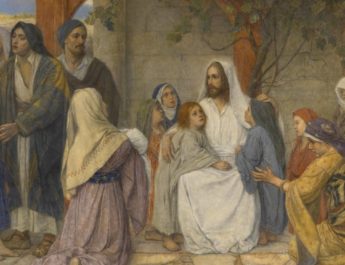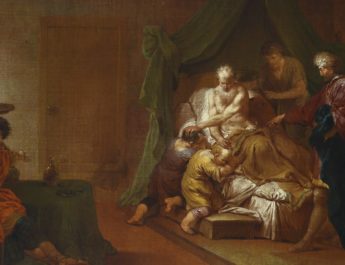BibleHub
2 The PhilistinesA drew up in lineB againstC Israel,D
Notes on verse 2a
A “Philistines” = Pelishti. From Pelesheth (Philistia); from palash (to mourn, wallow, maybe roll in). This is Philistines. Their name may mean “griever” or “burrower” or “weakener.” See https://www.abarim-publications.com/Meaning/Philistine.html.
B “drew up in line” = arak. This is to arrange by setting in a row. It can also mean to set a battle, estimate, put in order, or compare.
C “against” = qara. This is to meet, befall, happen upon. It can be to encounter by chance or for aggression.
D “Israel” = Yisrael. From sarah (to persist, exert oneself, contend, persevere, wrestle, prevail) + el (God or god). This is Israel, meaning God strives or one who strives with God; new name for Jacob and for his offspring. This refers to the people and to the land.
and when the battleE was joined,F Israel was defeatedG byH the Philistines,
Notes on verse 2b
E “battle” = milchamah. From lacham (to eat or feed on; figuratively, to battle as a kind of consumption/destruction). This is battle, war, fighting, or one who fights (i.e. a warrior).
F “joined” = natash. Properly, this is to beat or pound as when something is beaten in order to expand or disperse. It can be leave, abandon, allow, neglect, spread, fall, or thrust out.
G “defeated” = nagaph. This is to strike, beat, hurt, stumble, defeat, inflict disease.
H “by” = paneh. From panah (to turn, face, appear). This is face in a literal or figurative sense. It could be face, presence, anger, respect. It can also be used of God to indicate divine favor or presence.
who killedI about fourJ thousandK menL on the fieldM of battle.N
Notes on verse 2c
I “killed” = nakah. This is to hit whether lightly or severely. It can be used in a literal or figurative sense. So, this could be beat, punish, give wounds, kill, or slaughter.
J “four” = arba. From raba (to make square or be four-sided). This is four.
K “thousand” = eleph. Perhaps from the same as eleph (herd, cattle); from alaph (to learn, speak, associate with). This is thousand.
L “men” = ish. Perhaps from enosh (human, humankind, mortal); from anash (to be weak, sick, or frail). This is man, husband, another, or humankind.
M “field” = sadeh. This is literally field, ground, soil, or land. It can be used to mean wild like a wild animal.
N “battle” = maarakah. Related to “drew up in line” in v2. 19x in OT. From arak (see note B above). This is a row or rank. More broadly, it can refer to a formation such as used in a military setting or any other ordered arrangement.
5 OWhen the arkP of the covenantQ of the LordR cameS into the camp,T
Notes on verse 5a
O {untranslated} = hayah. This is to be or become, to happen.
P “ark” = aron. Perhaps from arah (to gather or pluck). This is a chest, box, or coffin. It is used for the Ark of the Covenant.
Q “covenant” = berit. Perhaps from barah (to eat, choose, make clear); perhaps from bar (grain, wheat); from bara (to select, purify, cleanse, test, brighten, polish). This is a compact, covenant, alliance, treaty, or league.
R “Lord” = YHVH. Related to {untranslated} in v5. From havah (to be, become) or hayah (see note O above). This is the name of the God of Israel, the self-existent and eternal one, the tetragrammaton. This pronunciation has been lost to time so “Lord” is generally used in its place.
S “came” = bo. This is to enter, come in, advance, fulfill, bring offerings, enter to worship, attack. It can also have a sexual connotation.
T “camp” = machaneh. From chanah (to decline, bending down, or living in tents; can be camping to create a home or camping as a part of battle). This is an encampment, whether of people traveling together or soldiers. So, it can be a camp band, or company as well as an army of soldiers. Also can be used of other groups like animals, angels or stars.
allU Israel gaveV a mightyW shout,X so that the earthY resounded.Z
Notes on verse 5b
U “all” = kol. From kalal (to complete). This is all or every.
V “gave” = rua. To break or destroy something so figuratively, an ear splitting sound such as a call of alarm or a joyful sound.
W “mighty” = gadol. From gadal (to grow up, become great, become wealthy – to advance. The root meaning may be to twist in the sense of the process of growing). This is great, high, bigger, noble, old, marvelous. It can also refer to someone who is powerful or distinguished.
X “shout” = teruah. Related to “gave” in v5. From rua (see note V above). This is an alarm, trumpet sound, battle cry, rejoicing, joyful shout, or jubilee.
Y “earth” = erets. Root may mean to be firm. This is earth, ground, field land, or country.
Z “resounded” = hum. 5x in OT. This is to roar, murmur, cause an uproar, agitate, be distraught. It is to defeat in battle, destroy.
6 When the Philistines heardAA the noiseBB of the shouting, they said, “What does thisCC greatDD shouting in the camp of the HebrewsEE mean?”
Notes on verse 6a
AA “heard” = shama. This is to hear, call, consent, or consider. It implies listening intelligently, giving attention, and, because of these two factors, obedience and action are often implied.
BB “noise” = qol. This is a sound, used often for human voices. Also used when God speaks or angels, animals or instruments. It can be a cry or a noise, thunder or earthquakes and so on.
CC {untranslated} = qol. Same as “noise” in v6. See note BB above.
DD “great” = gadol. Same as “mighty” in v5. See note W above.
EE “Hebrews” = Ibri. From Eber (the region beyond; Eber, the name of several Israelites including a descendant of Shem); from abar (to pass over, pass through, or pass by; cross over or to alienate; used for transitions). This is Hebrew, perhaps meaning a descendant of Eber.
When they learnedFF that the ark of the Lord had come to the camp, 7 the Philistines were afraid,GG for they said, “GodsHH have come into the camp.”
They also said, “WoeII to us! For nothing like this has happenedJJ before.KK
Notes on verses 6b-7
FF “learned” = yada. This is to know, acknowledge, advise, answer, be aware, be acquainted with. Properly, this is to figure something out by seeing. It includes ideas of observation, recognition, and care about something. It can be used causatively for instruction, designation, and punishment.
GG “were afraid” = yare. This is to fear, be afraid, dreadful. It can also refer to fearful reverence – to fear in a moral sense is to say to revere, respect.
HH “Gods” = elohim. Related to “Israel” in v2. From eloah (God, a god); from el (see note D above). This is most commonly used as a name for God. Technically, it’s in the plural, i.e. gods. It can also mean great, mighty, judge, or ruler.
II “woe” = oy. Perhaps from avah (to desire, crave, wish for, lust after). This is a mournful cry – woe, alas. Perhaps where the Yiddish “oy” comes from.
JJ “happened” = hayah. Same as {untranslated} in v5. See note O above.
KK “before” = ethmol +shilshom. Ethmol is 8x in OT. Probably from et (with, among, beside, including, toward, near); {from anah (to meet, happen, approach)} + mul (front, opposite, toward); {from mul (to cut short, circumcise, blunt, destroy)}. This is recently, formerly, yesterday. Shilshom is from shalash (to make triplicate, do a third time); from the same as shalosh (three, fork, three times). This is three days ago, before, yesterday in the past.
8 Woe to us! Who can deliverLL us from the powerMM of these mightyNN gods? These are the gods who struckOO the EgyptiansPP with every sortQQ
Notes on verse 8a
LL “deliver” = natsal. This is to snatch someone or something away in a good sense – as rescue, defend, or deliver – or in a bad sense – as strip or plunder.
MM “power” = yad. This is hand, ability, power. Hand in a literal sense, but also what one can do or the means by which one does it.
NN “mighty” = addir. From adar (wide, glorious, honorable, great, magnificent). This is majestic, excellent, mighty, powerful, or noble.
OO “struck” = nakah. Same as “killed” in v2. See note I above.
PP “Egyptians” = Mitsrayim. Perhaps from matsor (besieged or fortified place, bulwark, entrenchment; something hemmed in; a siege or distress or fastness); from tsur (to confine, besiege, to cramp). This is Egypt.
QQ “every sort” = kol. Same as “all” in v5. See note U above.
of plagueRR in the wilderness.SS 9 Take courage,TT and beUU men,
Notes on verses 8b-9a
RR “plague” = makkah. Related to “killed” in v2. From nakah (see note I above). This is a wound, injury, blow. Figuratively, it could be disaster, slaughter, or pestilence.
SS “wilderness” = midbar. From dabar (to speak, command, declare). This is mouth or speech. It can also be desert or wilderness. Additionally, it can be used for a pasture to which one drives cattle.
TT “take courage” = chazaq. This is to strengthen, seize, be courageous, repair, bind, heal, conquer, harden.
UU “be” = hayah. Same as {untranslated} in v5. See note O above.
O Philistines, in order notVV to become slavesWW to the Hebrews as they have beenXX to you; be men and fight.”YY
Notes on verse 9b
VV “in order not” = pen. Related to “by” in v2. Perhaps from panah (see note H above). This is lest, if, or.
WW “become slaves” = abad. This is to work, serve, or compel. It can describe any kind of work or service (including religious devotion). Also, till or cultivate. Used causatively, it can mean to enslave or keep in bondage.
XX “been” = abad. Same as “become slaves” in v9. See note WW above.
YY “fight” = lacham. Related to “battle” in v2. See note E above.
10 So the Philistines fought; Israel was defeated, and they fled,ZZ everyoneAAA to his home.BBB There was a veryCCC great slaughter,DDD
Notes on verse 10a
ZZ “fled” = nus. This is to flee, vanish away, hide, escape, be displayed.
AAA “everyone” = ish. Same as “men” in v2. See note L above.
BBB “home” = ohel. Perhaps from ahal (to shine, be clear). This is a tent, covering, home, or side pillar.
CCC “very” = meod. Perhaps from the same as uwd (firebrand, a poker). This is very, greatly, exceedingly. It can also mean vehemence, force, abundance.
DDD “slaughter” = makkah. Same as “plague” in v8. See note RR above.
for there fellEEE of Israel thirtyFFF thousand foot soldiers.GGG 11 The ark of GodHHH was captured,III
Notes on verses 10b-11a
EEE “fell” = naphal. This is to fall, whether by accident, to fall prostrate, or to fall in violent death. Figuratively, it can refer to personal ruin or calamity, a city falling, an attack or a falling away. It can also be a deep sleep or wasting away.
FFF “thirty” = sheloshim. Related to “before” in v7. From the same as shalosh (see note KK above). This is thirty or thirtieth.
GGG “foot soldiers” = ragli. 12x in OT. From the same as regel (foot, endurance, or journey; a foot as the means of walking and so it implies a step or a greater journey; can euphemistically mean private parts). This is on foot or a soldier (as one who goes on foot).
HHH “God” = Elohim. Same as “gods” in v2. See note HH above.
III “captured” = laqach. This is to take, accept, carry away, receive. It can also have the sense of take a wife or take in marriage.
and the twoJJJ sonsKKK of Eli,LLL HophniMMM and Phinehas,NNN died.OOO
Notes on verse 11b
JJJ “two” = shenayim. From sheni (double, again, another, second); from shanah (to fold, repeat, double, alter, or disguise). This is two, both, second, couple.
KKK “sons” = ben. From banah (to build or obtain children). This is son, age, child. It is son in a literal or figurative sense.
LLL “Eli” = Eli. From alah (to go up, climb, approach, bring; to be high or actively climb; can be literal or figurative). This is Eli, meaning “lofty.”
MMM “Hophni” = Chophni. 5x in OT. From the same as chophen (fist, handful). This is Hophni, a name that may mean “boxer.”
NNN “Phinehas” = Phinechas. Perhaps from peh (mouth in a literal or figurative sense; literally, beak or jaws; figuratively, speech, commands, or promises); {perhaps from pa’ah (to puff, scatter, cut in pieces)} + nachash (a serpent or snake); {from nachash (to divine, interpret omens, learn from experience, observe; to hiss)} OR from panah (to turn, face, appear) + chasah (to seek refuge). This is Phinehas, a name that may mean “mouth of a serpent,” “bronze-colored one,” “mouth of brass,” “oracle,” “trust your heart,” or “turn and hide.” See https://www.abarim-publications.com/Meaning/Phinehas.html
OOO “died” = mut. This is to die in a literal or figurative sense. It can also refer to being a dead body.
19 Now his daughter-in-law,PPP the wifeQQQ of Phinehas, was pregnant,RRR about to give birth.SSS When she heard the newsTTT that the ark of God was captured
Notes on verse 19a
PPP “daughter-in-law” = kallah. Related to “all” in v5. Perhaps related to kalal (to complete, perfect). This is bride or daughter-in-law and the term is used before and after marriage.
QQQ “wife” = ishshah. Related to “men” in v2. From ish (man); perhaps from enosh (human, humankind, mortal); from anash (to be weak, sick, or frail). This is woman, wife, or female.
RRR “pregnant” = harah. 16x in OT. From harah (to conceive or be pregnant –literal or figurative). This is conceive or pregnant.
SSS “about to give birth” = yalad. This is to bear or bring forth. It can mean to act as midwife or to show one’s lineage. This is often used for birth or begetting.
TTT “news” = shemuah. Related to “heard” in v6. From shama (see note AA above). This is something heard – news, a rumor, fame, announcement.
and that her father-in-lawUUU and her husbandVVV were dead, she bowedWWW and gave birth, for her labor painsXXX overwhelmedYYY her.
Notes on verse 19b
UUU “father-in-law” = cham. 4x in OT. Perhaps from the same as chomah (a wall – a wall as used for protection). The root may refer to something that joins. So, this is father-in-law.
VVV “husband” = ish. Same as “men” in v2. See note L above.
WWW “bowed” = kara. This is to bow, crouch, kneel down, subdue. It is to bend the knee in many senses. It can also mean to smite, a woman crouching in childbirth, or bowing to worship God.
XXX “labor pains” = tsiyr. Related to “Egyptians” in v8. 12x in OT. From tsur (see note PP above). This is ambassador or messenger. It could also mean hinge, pain, or sorrow.
YYY “overwhelmed” = haphak. This is to turn, overturn, change, return, turn over, pervert.
20 As she was about to die, the women attendingZZZ her saidAAAA to her, “Do not be afraid, for you have borne a son.” But she did not answerBBBB or giveCCCC heed.DDDD
Notes on verse 20
ZZZ “attending” = natsab. This is to station, appoint, establish, take a stand.
AAAA “said” = dabar. Related to “wilderness” in v8. See note SS above.
BBBB “answer” = anah. This is answer, respond, announce, sing, shout, or testify. It means to pay attention, which implies responding and, by extension, starting to talk. Used in a specific sense for singing, shouting, testifying, etc.
CCCC “give” = shith. This is to place, set, bring, appoint, consider, bring, array or look.
DDDD “heed” = leb. May be related to labab (to encourage; properly, to be encased as with fat; used in a good sense, this means to transport someone with love; used in a bad sense, it can mean to dull one’s senses). This is the heart, courage, one’s inner self, the mind, or the will. Heart is only used in a figurative sense in the Old and New Testaments.
21 She namedEEEE the childFFFF Ichabod,GGGG meaning, “The gloryHHHH has departedIIII from Israel,” because the ark of God had been captured and because of her father-in-law and her husband. 22 She said, “The glory has departed from Israel, for the ark of God has been captured.”
Notes on verses 21-22
EEEE “named” = qara. This is to call or call out – to call someone by name. Also used more broadly for calling forth.
FFFF “child” = naar. May be from na’ar (to shake, toss up and down, tumble around). This is a child or a servant. It is a child in their active years so they could be aged anywhere from infancy to adolescence.
GGGG “Ichabod” = I-kabod. 2x in OT. From iy (not, island); {probably related to ay (where, how, whether); perhaps from ayin (where)} + kabod (weighty; glorious, abundant, riches, honor, splendor; referring to reputation or character; often used to describe God and God’s presence); {from kabad (to be heavy, weighty, burdensome)}. This is Ichabod, meaning “inglorious” or “(there is) no glory.”
HHHH “glory” = kabod. Related to “Ichabod” in v21. See note GGGG above.
IIII “departed” = galah. This is to remove, bring, carry, lead, appear, advertise. It can mean to strip someone or something bare in a negative sense. Captives were typically stripped before they were sent into exile. Used figuratively, in a positive sense, this word means reveal, disclose, discover.
Image credit: “Steven Spielberg’s incarnation of the Ark of the Covenant from the feature film ‘Indiana Jones and the Raiders of the Lost Ark.'” Photo by Mary Harrsch, 2015.




